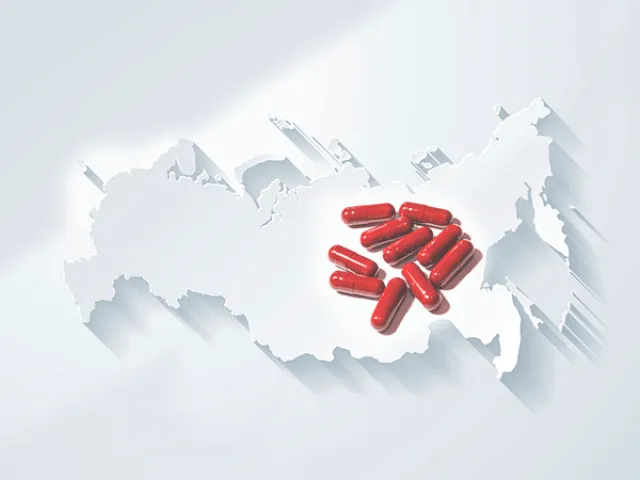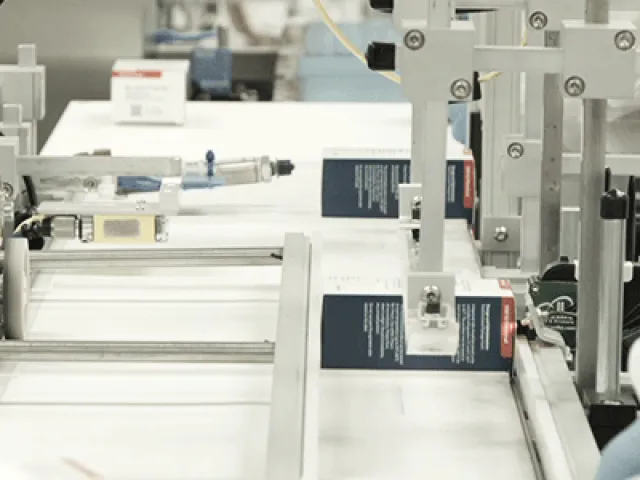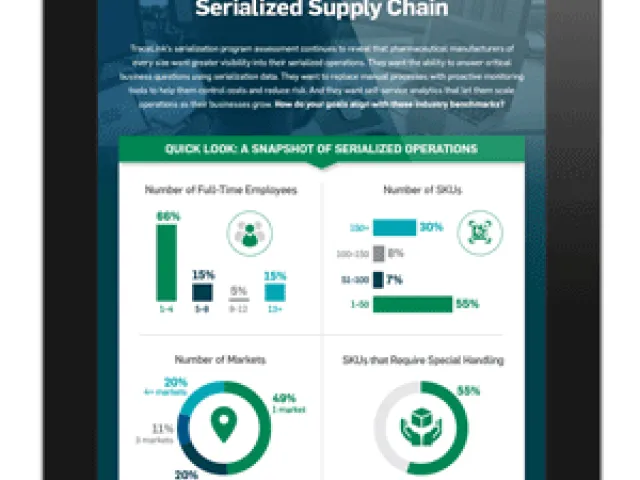Table of contents
April 2020 Update: The current compliance deadline for all medicines manufactured in Russia or imported into Russia is July 1, 2020. As of December 31, 2019, medicines that fall under the government’s HCN/7 Nosologies guidelines are expected to comply with the current serialization requirements, which comprise 4 elements: Product Code (GTIN), Serial Number, Crypto Key, and Crypto Code. Expiry Date and Batch Number are no longer required. See the latest Russia Regulatory Updates for news on Russia Track and Trace regulations.
 The January 1, 2020 deadline for compliance with Russia’s track and trace law—which features the most complex product serialization and regulatory reporting requirements in the industry—is coming up fast. Pharmaceutical companies that have yet to start implementing a comprehensive compliance solution need to act now.
The January 1, 2020 deadline for compliance with Russia’s track and trace law—which features the most complex product serialization and regulatory reporting requirements in the industry—is coming up fast. Pharmaceutical companies that have yet to start implementing a comprehensive compliance solution need to act now.
With a proven track record of helping customers in more than 45 countries achieve compliance with complex and varying serialization regulations—and a track and trace solution designed specifically for manufacturers serving the Russian market—TraceLink is the right choice for your Russia compliance needs.
We recently sat down with TraceLink Senior Program Manager Pavel Lotkov, a Russia compliance expert, to get his insights on the Russia Compliance solution. Prior to joining TraceLink, Russia-native Lotkov served as the track and trace implementation leader for Eli Lilly and Company's global serialization program. In this interview, he discusses some of the key benefits of TraceLink’s Russia Compliance solution, including automated reporting, crypto code management, and options for local support. He also offers some sage advice for pharmaceutical companies on the journey to Russia compliance.
Can you describe the main steps pharmaceutical manufacturers, distributors, and dispensers need to take to achieve readiness for Russia compliance?
Pavel Lotkov: Russia’s new federal law is the most complex track and trace regulation in the world, and it requires several steps. Some of the main steps include registering with Russia’s regulatory authority, documenting your current Russia supply chain, designing and documenting updated business processes, reviewing packaging capabilities, gathering master data, and conducting internal systems integrations and integrations with trade partners.
What is TraceLink’s Russia Compliance solution and how will it reduce complexity for customers?
Lotkov: For manufacturers distributing product in Russia, TraceLink’s Russia Compliance solution provides compliance-as-a-service, ensuring that the manufacturer is always in compliance with the regulation. An important thing to remember about TraceLink’s Russia Compliance solution is that it’s based on TraceLink’s core serialization, integration, and compliance functionality that is trusted by more than 780 pharmaceutical manufacturers and contract manufacturers around the world. The solution includes transaction management, master data management, user management—all the key things needed for a system to support serialization, regulatory compliance, and good automated manufacturing processes, or GAMP. TraceLink’s Russia Compliance solution takes this proven foundation and adds things specific to the Russian market, like crypto code management, business logic for automated event reporting, and regulatory document creation. TraceLink's Russia Compliance solution lets you manage dozens of distinct serialization events, including commissioning/decommissioning, aggregation, and destruction. And most of the regulatory reporting is fully automated, which is important, especially for companies that make lots of shipments daily.
Why is it important for pharmaceutical supply chain companies to select a global enterprise platform, as opposed to local point solutions, to achieve Russia compliance?
Lotkov: For a company with global operations that must be compliant with many regulations for various markets, it’s very helpful to have a single system taking care of your compliance requirements. All the serial numbers live in one system, so you have full control of your serial number strategy and better visibility into worldwide operations. Additionally, having one system opens the possibility to look beyond compliance and leverage that data for more value-added types of projects like reporting and analytics, which can help improve supply chain efficiency. But it’s also important to look outside of the solution itself. TraceLink’s regulatory experts and project managers put in a great deal of time working with customers to help ensure their compliance projects are successful. To date, our solutions have processed more than 540 million regulatory compliance documents for customers in various countries—each with different compliance requirements—around the globe.
How does TraceLink support companies in Russia at the local level?
Lotkov: TraceLink offers a great deal of customer support at the local level in Russia. For starters, I will be moving back there soon and will be available to help support customers. Additionally, we have partnerships with Korus Consulting, a well-known Russian-based IT firm, and Excellis Health Solutions, a certified TraceLink partner. Our partnerships with these companies enable TraceLink to service the needs of the Russian market with local subject matter expertise and resources in the native Russian language. Both Excellis and Korus have deep expertise on the regulations and the TraceLink platform. As a certified TraceLink partner, Excellis has gone through a rigorous certification process to be able to implement our solution. TraceLink also has support resources in the US, Europe, and India, so we can provide support around the clock. Additionally, TraceLink has well-established lines of communication with CRPT, the operator of the Russian Drug Circulation Monitoring System. They are speaking at our Russia Compliance Workshop in Moscow in September, and we have frequent meetings with them to discuss our solution and the evolving Russian regulations. Our product teams and regulatory experts work closely with CRPT and are constantly monitoring for any changes or updates to the regulations so we can update our Russia Compliance solution right away.
What are some of the key compliance events that companies will be required to track and report?
Lotkov: A unique requirement of the Russian market is that pharmaceutical supply chain companies need to request crypto codes and that’s something we achieve with our crypto application. They also need to send reports to the Russian regulatory authority on things like packaging, batch release, shipment, importing and exporting, aggregation, sampling, commissioning and decommissioning, and recalls. Depending on their processes, there are up to 36 events that manufacturers need to track and report. The big challenge here is that the requirements are always shifting. One of TraceLink’s key strengths is that we have extensive experience dealing with shifting regulations both in Russia and around the globe. TraceLink has been focused on global compliance for more than ten years, and we’re staffed to be able to deal with frequent changes in requirements. And as I mentioned, TraceLink automates much of the reporting that is required. For example, once a manufacturer identifies the reportable events that are applicable to them, the proper workflows can be enabled. Once the interfaces are established within their systems, compliance reports will be triggered automatically.
The new regulations require companies to include unique cryptographic codes in the 2D data matrix barcode on packaging labels for all covered medicines. What challenges does this create?
Lotkov: It creates all kinds of challenges, starting with applying those cryptos on packaging inside the 2D barcode—and being able to do it without significant impact to production speed and without increasing failure rates. The industry has learned that this is very difficult to achieve. Requesting and managing the crypto codes and being able to share them with production sites or with contract manufacturing organizations is a challenge as well. TraceLink takes care of that through our Russia crypto application as well as through existing modules that were updated to handle crypto codes for the serial number exchange.
The new regulations mandate that companies connecting to the MDLP—Russia’s federal repository and drug tracking information system—must digitally sign transactions from servers located in Russia. How does TraceLink help customers achieve this?
Lotkov: TraceLink has invested in data centers in Russia in Moscow and St. Petersburg. The transactions will flow through our servers in Russia, where they will be digitally signed before they end up in the MDLP. For TraceLink’s Russia Compliance customers, this will be a seamless process.
Do you have any closing advice for customers as they prepare their companies for Russia compliance?
Lotkov: The fact is that companies beginning their Russia compliance journey now are already late. So, the sooner they get started, the better. That means getting started on identifying the various business processes, documenting their supply chain, and getting a handle on master data. They need to pick a compliance solution and start implementing it and start training their personnel on the new system and business processes. It’s also good to get educated on what is required by the regulations, and this is an area where TraceLink can help. We have a rich user community and there are many webinars, workshops, live events, and community forums that TraceLink provides around Russia and other worldwide locations. Those are great benefits that can certainly help customers come out of this in a successful way.









